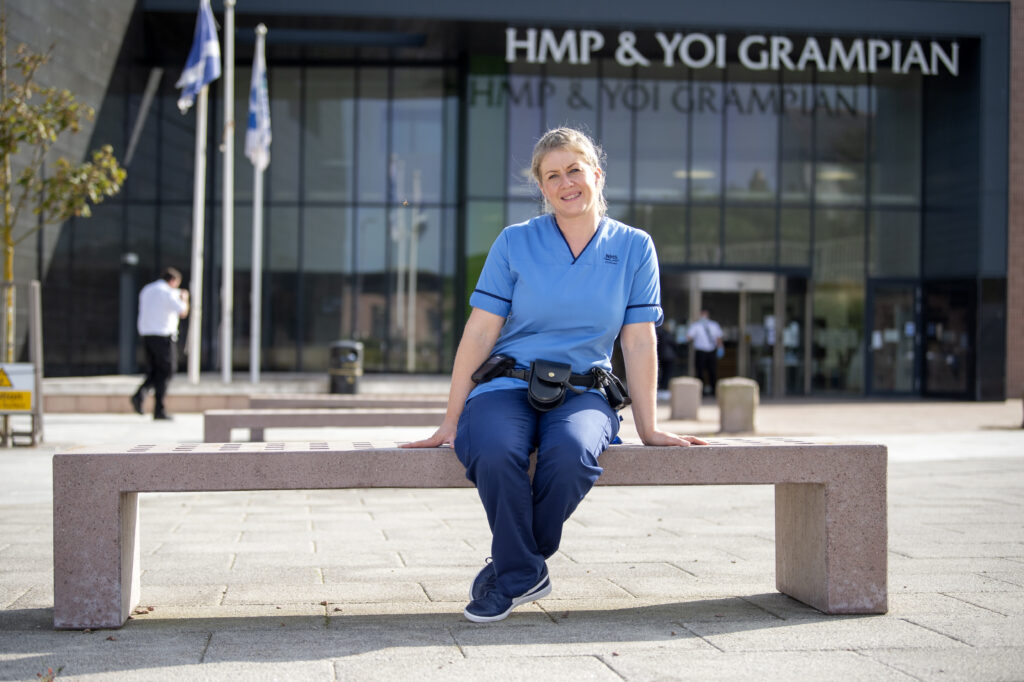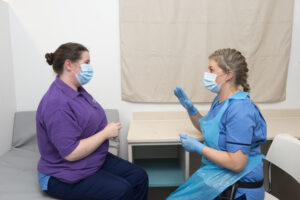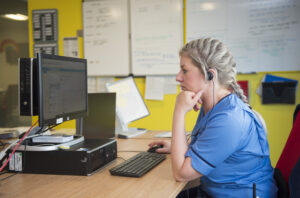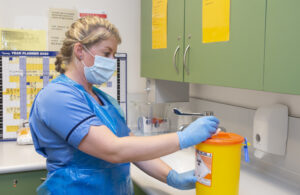Lisa Benson
Prison Nurse Team Lead in Substance Misuse
HMP Grampian, Aberdeenshire

I was originally drawn to emergency nursing because it’s fast paced with lots of variety and lots of learning opportunities. After my nurse training, I travelled abroad and worked in a medical surgical unit. Once I had my children, I worked in a nursing home – but always felt that something was missing, and I think it was that sense of immediacy. When the post came up at the prison, I thought there was no chance but after an opportunity to look round the prison I thought, I could do this. Forensic nursing was always an interest and before I knew it, I began working there part time. Sometimes prison nursing feels like a forgotten service, and I wanted to be somewhere I could make a difference. I had already developed skills that I knew I could apply in the prison, skills that could help shape someone during a vulnerable time in their life.

People don’t understand why you would want to take care of people who have been convicted of a crime but we’re all someone’s child and I think anyone can take a wrong turn. Everyone has their own story, and you have to remember that this is someone’s real life, not a tv drama. The trauma someone suffers or the lifestyle they have been exposed to are not always as a result of their own choices. I want to help people back to a sense of normality and stability; I want prison to be a rehab for them.
As part of joining HMP Grampian, I was given the chance to work with the substance misuse team. I am now the team lead. A third of our population have problems with drugs or alcohol. The people I see teach me a lot, their treatment is designed for each individual, and I believe in developing links between prison and the local community to support them. It’s true that some people feel safer in prison. People without trust in themselves or anyone else, may lead chaotic lives with little or no stability. I teach harm reduction and coping mechanisms, to allow people to make healthy changes. As part of my role, I introduced a transfer of care document with multi-organisational links. Whether it’s arranging GP appointments or moving people into housing and hostels I want to provide people with links to the community services they need. Whilst they’re in prison they may be sober for the first time in years, so I use the opportunity to talk about health and do blood work or have mental health assessments completed. It’s about providing each individual with the information, confidence and support they need to create new pathways.

The QN development programme has made me realise how often I put up barriers. I was cagier than most about sharing my thoughts and feelings. Situations don’t scare me, but consequences do – I worry about the future. The programme has helped me identify my own barriers so I can process whether they’re healthy or necessary. The first day of the residential I was worried about the creative stuff but there’s something magic about the programme that makes you feel safe. The cohort are amazing, they feel handpicked for me; it’s such an important support network of nurses because working in a prison can be so isolating.

I had been establishing relationships between the prison and outside services to help build sources of support for people. This system had to be put on hold once the lockdown was announced. The management team were shielding so I was the only band 6 working on the floor and dealing with the crises that occurred. The prisoners really behaved well throughout; although their mental health needs changed, we were able to manage it quite well. Previously I would provide one-on-one interventions either weekly or fortnightly, but COVID meant this was reduced to handling emergency cases only. There is a lot of pressure to do a quick check when prisoners come for their medication in the morning as this is the only time, they were seeing a nurse. There were no visits from families, and they couldn’t use the phone. I have been coping by checking in with the other Queen’s Nurses. Sometimes you feel as though you’re putting on a brave face all the time, at work to keep the team together and at home to let your family know you’re okay, but with the connection of the 2020 cohort, I have been able to share more of myself and get support for myself when I need it.
